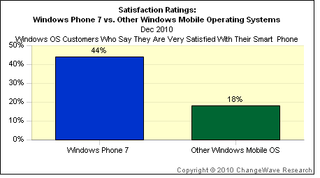Independent survey contradicts Microsoft's claim on Windows Phone 7 satisfaction

Polling and survey data will always be controversial--there are means, averages, sample sizes, how questions are phrased/framed, etc. resulting in multiple ways of interpretation. Recently, Microsoft's Greg Sullivan went on record with some internal survey results on Windows Phone 7 user satisfaction stating that customer satisfaction for Windows Phone 7 is at 93% and brand awareness is increasing, up 22 points to 66%.
This of course sounds real good, but we're going on Sullivan's word here and cannot verify those numbers. Now ChangeWave, an independent survey group, has come out with their own numbers and while Windows Phone is improving in status and satisfaction, they are nowhere near as high as what Microsoft claims. ChangeWave's survey involved 4,050 participants which is a very sizeable number. Here are some of their results (reprinted from NetworkWorld):
- 5% have their "sights set on Windows Phone"--which is an increase from the previous 1% and is the only smartphone with a boost in demand
- 44% of Windows Phone 7 owners consider themselves "very satisfied" (big improvement from Windows Mobile's 18%) as of Dec 2010
By way of comparison, Android has a 58% approval rating and the iPhone still tops out at 72% being "very satisfied". NetworkWorld expects those Android numbers to go up with Froyo 2.2 on Android as it "solves" many of the previous problems on that OS. Although, one could also claim the same about Windows Phone after our next few updates scheduled for this year.
Still, the point being that as of now 44% is a stark contrast to Sullivan's claim of 93%. Both sides are a little obscure on their methodology, though we can say that ChangeWave is certainly more transparent with hard numbers than Microsoft is on the matter (plus you can at least purchase ChangeWave's data). But without knowing which questions were asked, it's hard to make a direct comparison. But, reluctantly, we're less believing of Microsoft's stats than ChangeWave's for what should be an obvious difference in biases.
So which is it audience? What we want to believe, what seems more likely or both are wrong for X reason? Share in comments...
Source: ChangeWave (private); via NetworkWorld
Get the Windows Central Newsletter
All the latest news, reviews, and guides for Windows and Xbox diehards.

Daniel Rubino is the Editor-in-chief of Windows Central. He is also the head reviewer, podcast co-host, and analyst. He has been covering Microsoft since 2007, when this site was called WMExperts (and later Windows Phone Central). His interests include Windows, laptops, next-gen computing, and watches. He has been reviewing laptops since 2015 and is particularly fond of 2-in-1 convertibles, ARM processors, new form factors, and thin-and-light PCs. Before all this tech stuff, he worked on a Ph.D. in linguistics, watched people sleep (for medical purposes!), and ran the projectors at movie theaters because it was fun.
